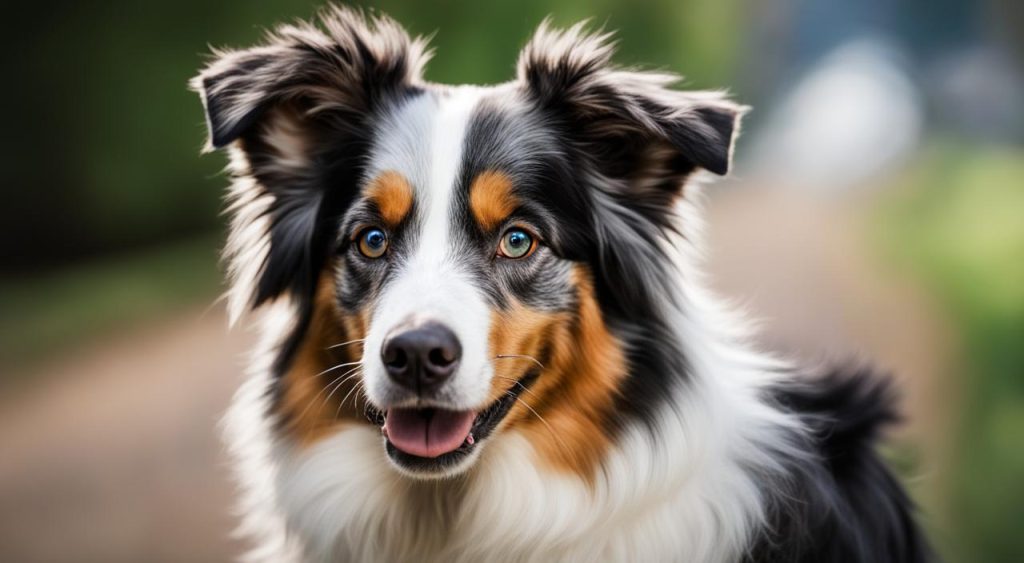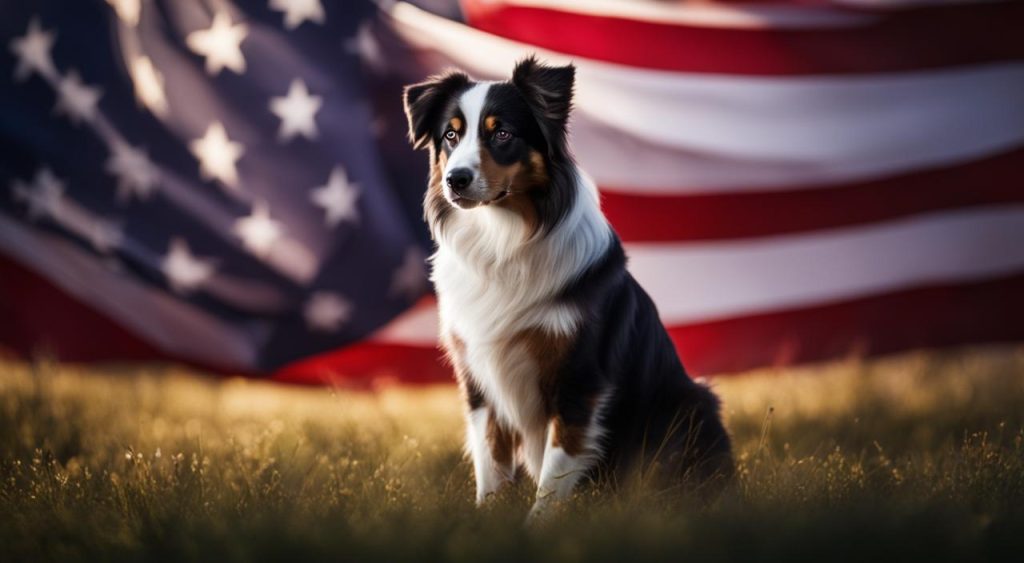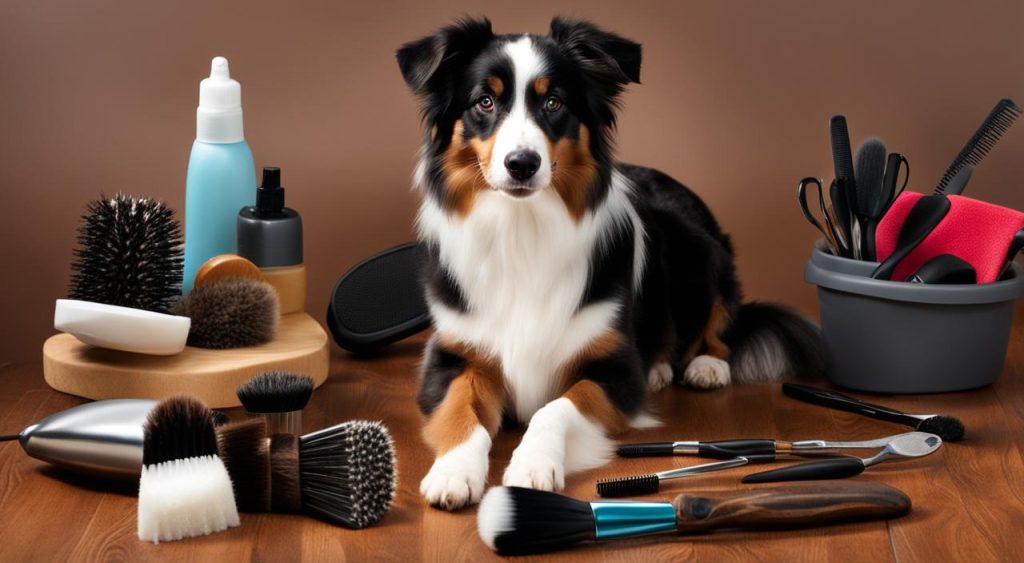Miniature Australian Shepherds, also known as Mini Aussies, are a beloved breed known for their intelligence, agility, and loyalty. Like any breed, Mini Aussies can be prone to certain health issues. It’s important to be aware of these common health problems to ensure the well-being of your furry friend.
Common health issues in Mini Aussies include gastrointestinal issues, such as diarrhea and vomiting, which can cost an average of $345 and $300 for treatment, respectively. Eye issues can also be a concern, with an average cost of treatment amounting to $170. Additionally, behavioral conditions may arise, with an average cost of treatment of $125.
Understanding the potential health risks in Miniature Australian Shepherds allows you to take proactive measures to maintain their health and happiness. From regular veterinary check-ups to a balanced diet and exercise, providing the right care can help minimize the impact of these health concerns.
Key Takeaways:
- Mini Aussies can be prone to gastrointestinal issues like diarrhea and vomiting.
- Eye issues can also affect Miniature Australian Shepherds.
- Behavioral conditions may arise and require proper treatment.
- Regular veterinary check-ups and a balanced diet are crucial for their well-being.
- Providing adequate exercise can contribute to their overall health and happiness.
Breed History of Miniature Australian Shepherds
Miniature Australian Shepherds have a rich history intertwined with their larger counterparts, Australian Shepherds. Originally, these dogs were bred in the Basque region, which spans parts of Spain and France, where they were used as skilled working and herding dogs. However, it was not until the 1960s in California that breeders began intentionally crossing the smallest Australian Shepherds to create the Miniature Australian Shepherd breed we know today.
Mini Aussies quickly gained popularity due to their manageable size, intelligence, and versatility. They found their place as beloved family companions, excelled in agility competitions, and proved invaluable working alongside livestock on large properties. The development of Miniature Australian Shepherds has allowed dog enthusiasts to enjoy the charm and capabilities of the Australian Shepherd breed in a smaller package.
Attributes of Miniature Australian Shepherds
Miniature Australian Shepherds, commonly known as Mini Aussies, possess a range of admirable attributes that make them beloved companions and versatile working dogs. Sharing many qualities with their full-sized counterparts, Mini Aussies have a distinct set of characteristics that set them apart.
One notable attribute of Miniature Australian Shepherds is their thick, weather-resistant double coat. This coat not only provides protection from the elements but also gives these dogs their iconic appearance. While Mini Aussies do shed, it is important to note that shedding occurs only twice a year, making them relatively low-maintenance in terms of coat care.
“The Mini Aussie’s double coat is not only beautiful but also functional, allowing them to thrive in various weather conditions,”
Beyond their physical characteristics, Miniature Australian Shepherds are highly intelligent. They have a natural aptitude for learning and can quickly grasp new tricks and commands. This intelligence, coupled with their eagerness to please, makes them an excellent choice for owners who enjoy training their dogs and engaging in mentally stimulating activities.
“Mini Aussies are like little sponges, soaking up knowledge and always ready to impress you with their problem-solving abilities,”
In terms of exercise needs, Mini Aussies are an active breed that requires at least one hour of physical activity per day to stay mentally and physically healthy. They thrive on regular exercise and enjoy a variety of activities, including walking, running, hiking, and off-leash running. Their agility and nimbleness make them well-suited for participating in various canine sports and activities.
“If you lead an active lifestyle and are looking for a four-legged companion who can keep up with you, a Miniature Australian Shepherd might be your perfect match,”
One of the primary reasons why Miniature Australian Shepherds are highly sought after is their suitability as family dogs. They have a natural affinity for children and can form strong bonds with their human family members. Mini Aussies thrive in active homes where they can participate in family activities and enjoy quality time with their loved ones.
” Miniature Australian Shepherds are wonderful additions to any family looking for a loyal, loving, and active companion. They are eager to be part of your adventures and bring joy to every moment spent together,”
Overall, Miniature Australian Shepherds possess a unique blend of physical attributes, intelligence, exercise needs, and family-oriented temperament. Their thick double coat, combined with their intelligence and active nature, makes them versatile and well-suited for various lifestyles and activities. Whether you are looking for a faithful family companion or an energetic working partner, Mini Aussies have the attributes to meet your needs.
Training and Socialization of Miniature Australian Shepherds
Miniature Australian Shepherds are intelligent and can be easily trained with the right techniques and approach. Consistency, patience, and positive reinforcement are essential when training a Mini Aussie. By using rewards such as treats or praise, you can motivate your Miniature Australian Shepherd and make the training sessions enjoyable for both of you.
In addition to obedience training, socialization is a crucial aspect of raising a well-rounded Mini Aussie. Introduce your Miniature Australian Shepherd to various people, animals, and environments from a young age. This exposure will help them develop good social skills and become comfortable in different situations.
“Consistency, patience, and positive reinforcement are essential when training a Mini Aussie.”
Engaging your Miniature Australian Shepherd in mental stimulation activities is also important to keep them mentally and physically healthy. Mini Aussies are highly intelligent and need mental challenges to prevent boredom and destructive behavior. Consider puzzle toys, obedience training, or interactive games that encourage problem-solving and learning.
By focusing on positive reinforcement training methods, providing ample socialization opportunities, and engaging your Miniature Australian Shepherd’s mind, you can help them become well-behaved, confident, and happy members of your family.
Grooming and Care for Miniature Australian Shepherds
Grooming is an essential part of caring for your Miniature Australian Shepherd, also known as a Mini Aussie. Regular grooming not only helps keep their coat healthy and beautiful but also contributes to their overall well-being.
Grooming Needs: Mini Aussies should be brushed multiple times a week to minimize shedding and remove any tangles or matting. This helps keep their coat clean and prevents discomfort for your furry friend.
Dental Care: Taking care of your Mini Aussie’s teeth is crucial to maintain their oral health. Brush their teeth regularly with a dog-friendly toothbrush and toothpaste to prevent dental issues and bad breath.
Ear Care: Checking and cleaning your Miniature Australian Shepherd’s ears on a weekly basis is important to avoid infections and moisture build-up. Use a veterinarian-approved ear cleaning solution and gently wipe the outer area of the ears with a soft cloth or cotton pad.
Nail Trimming: Monthly nail trimming is necessary for Mini Aussies to keep their nails at a proper length. Regular nail care prevents discomfort, reduces the risk of nail-related injuries, and protects your furniture and floors.
Baths: Depending on your Mini Aussie’s activities, baths may be required every other month or as needed. Use a gentle dog shampoo and rinse thoroughly to keep their coat clean and free from dirt or debris.
By following these care tips and incorporating regular grooming into your Miniature Australian Shepherd’s routine, you will help them maintain a healthy coat, good oral hygiene, and overall well-being.
Miniature Australian Shepherd Genetic Health Disorders
Miniature Australian Shepherds can be affected by certain genetic health disorders that owners should be aware of. These include:
MDR1 Gene: The MDR1 gene, found in about 50% of Mini Aussies, affects their ability to remove certain drugs from the brain. It is important for owners to be aware of this gene as it can impact the dog’s response to medications and anesthetics.
“The MDR1 gene in Mini Aussies can have significant implications for their healthcare. It is crucial to inform your veterinarian about this genetic predisposition when seeking treatment for your Miniature Australian Shepherd.”
Degenerative Myelopathy: Degenerative Myelopathy is a progressive disease of the spinal cord that primarily affects older dogs. It leads to hind limb weakness and eventually paralysis, impacting the dog’s quality of life.
Progressive Retinal Atrophy (PRA-PRCD): PRA-PRCD is a progressive degeneration of the retina, leading to vision loss and potential blindness in Mini Aussies. Responsible breeding practices can help reduce the incidence of this condition.
Hereditary Cataracts: Miniature Australian Shepherds can be prone to hereditary cataracts, which are caused by the HSF4 gene. These cataracts can interfere with the dog’s vision and may require surgical intervention.
“Genetic health disorders like Degenerative Myelopathy, Progressive Retinal Atrophy, and Hereditary Cataracts can impact the well-being and quality of life of Miniature Australian Shepherds. It is essential to work with responsible breeders who perform genetic testing to prevent the passing of these disorders to future generations.”
By understanding these genetic health disorders and working with responsible breeders, owners can take proactive measures to ensure the health and well-being of their Miniature Australian Shepherds.
Conclusion
To summarize, while Miniature Australian Shepherds are generally healthy dogs, there are some health concerns that owners should be aware of. Common health problems in Mini Aussies include gastrointestinal issues, eye problems, and behavioral conditions. These issues can be managed through regular veterinary check-ups and appropriate treatment.
To ensure the overall health and well-being of your Miniature Australian Shepherd, it is essential to provide them with proper nutrition, regular exercise, and mental stimulation. Regular grooming, including brushing their coat and cleaning their ears, is also important for their care.
Furthermore, responsible breeding practices play a crucial role in minimizing the risk of genetic health disorders in Mini Aussies. Genetic tests can help identify potential health issues and ensure that only healthy dogs are used for breeding.
By being proactive and attentive to your Mini Aussie’s health needs, you can help them lead a happy and healthy life. Remember to consult with your veterinarian for any specific concerns or questions you may have regarding your Miniature Australian Shepherd’s health.





